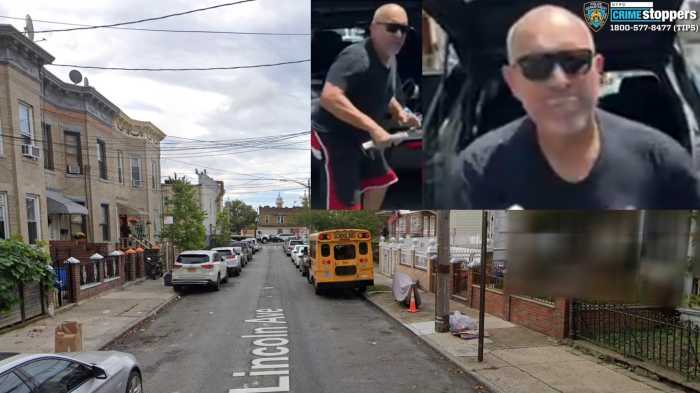
BY DUSICA SUE MALESEVIC | Many writers have one thing in common: they excel at procrastination. But a writing workshop in Chelsea has been keeping writers on track for 22 years — instructing and inspiring those who hunger to express themselves through the written word.
“With a group it imposes a sense of discipline,” Bern Nix told Chelsea Now on Thurs., Aug. 25, before the start of the annual public reading of the Holy Apostles Soup Kitchen Writers’ Workshop.
Nix, a musician who plays guitar, has performed countless times, but this would be the first time he would read his written work — creative nonfiction and prose poems — before an audience.
He joined the workshop this past winter after seeing a poster plastered on a newspaper box.
“I’m at the point in my life, I want to develop my craft,” said Nix, who has lived in Chelsea since the 1970s. “[The workshop] is a good thing. It’s like playing an instrument. You have to do it every day.”
Nix hadn’t decided yet what he was going to read, but ultimately settled on “Mockery 2,” “Victrola,” and “The Discreet Banquet of the Comfortable Class.”
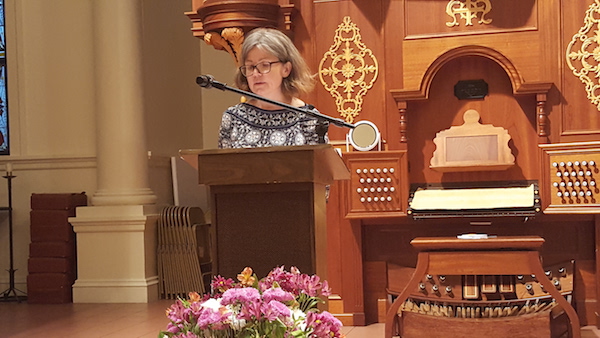
Started in 1994 by Ian Frazier, a New Yorker writer and author, the workshop has had over 300 participants throughout its years.
Hannah Albee, one of the workshop’s three instructors, kicked off the night’s reading at Holy Apostles Church (296 Ninth Ave., at W. 28th St.). She noted that the reading was taking place, fittingly, where just a few hours earlier around 1,000 meals were served.
Since 1982, Holy Apostles Soup Kitchen has fed many without any proof of need, said Albee, who is also the communications manager for the soup kitchen.
“Like our meals offered to anyone who comes to our door, the writer’s workshop has evolved over the years to be a place for anyone who is hungry for ‘Food for the Soul,’ ”Albee said, referencing the name of the workshop’s blog (holyapostlessoupkitchen.wordpress.com).
There are two 12-week sessions, one in the fall and one in the winter/spring, with the writers meeting once a week for two hours, Albee explained.
On that Thursday evening, in the white high-ceiling vaulted room, writers shared pieces they had created or shaped during the workshops — offering a lyrical feast for listeners’ ears.
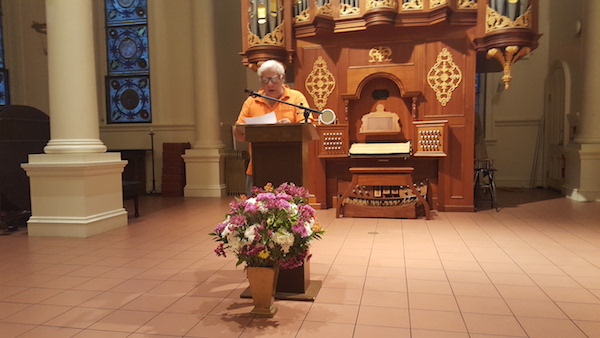
Poet Michael La Bombarda took the podium first — the front of which was festooned with a spray of flowers. His “Short Poem” compared poetry to football.
“Every time I come to the end of the line/As if I were a running back/And each line that I write/Is a touchdown in the end zone./Stop. Dance. Flip the poem to the stands.”
La Bombarda has been participating in the workshop for two years.
“It helps me to get out of myself,” said La Bombarda, who was born in Chelsea but now lives in Murray Hill. “I’m glad they make it available to people for most of the year — it’s a great thing.”
Next up was Stephanie Lawal, who read her poem “Dessert,” where “Physiology has created a/Hard on the outside/Soft on the inside/Candy/Tart yet gooey.”
Lawal, who lives in Long Island, explained later to Chelsea Now that “pretty much everything I write has a personal aspect to it.”
She has been attending the workshop on and off for about four years and keeps coming back because of the instructors — Albee, Yvonne Cassidy and Brooke Wiese — and the people who take part in the program.
“They all have a different way of coming at the writing and inspiring us,” she said. “And the group itself — everyone’s experiences are so different.”
Lawal has always been a writer, but the workshop “gave me the impetus to start writing after a long hiatus.”
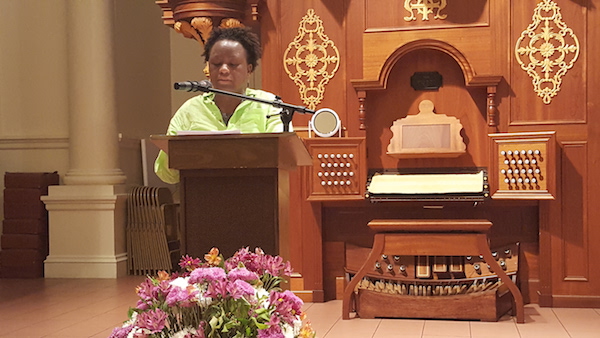
Llima Berkley is new to the workshop and, for the first time, she read her poem “Captive” for an audience.
Berkley, who is homeless and lives at a shelter in Queens, says the workshop has been helpful and is building her confidence in her writing.
“You know [when you’re] by the water, you tend to stay at the edges, and look at the deeper part, and say ‘I don’t know about that,’ ” she explained. “This kind of environment makes you feel better.”
For another workshop writer, Tanya Jones, who has been writing since middle school, it was “a privilege to let people hear my work.”
The Chelsea resident read “The Venus Fly Trap,” a look at how she tried to get rid of the pugnacious plant from her living room. First, she tried feeding it stuffed crepes, then a jalapeno hot dog “hoping and praying I would choke him. From the spice.” Finally, “I threw the thing the Comet BBQ. All of sudden out of nowhere, the thing combusted…Comet BBQs any day, every day!”

Food — or the lack thereof — was also a theme of longtime workshop member, Annie Quintano’s “Dolores’ Bowl.” Quintano told Chelsea Now she writes flash fiction, or short, short stories.
“I love to write,” Quintano said. “It’s almost like a necessity.”
For eight years she has participated in the program, and she said it is an opportunity to have a community of writers, and receive feedback that helps her grow as a writer and as a human being.
Quintano, who lives in NoMad, also did the illustrations for this year’s anthology, which is available for five dollars (visit the blog to purchase).
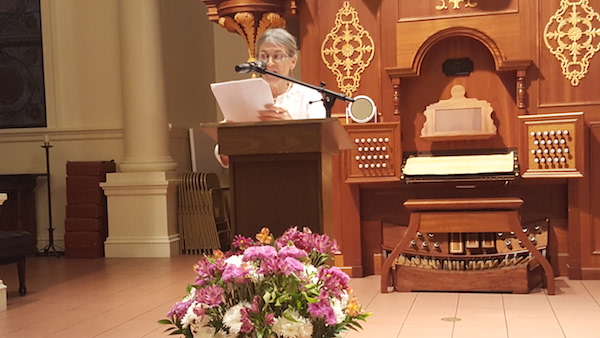
Marlé Thomas, a poet and songwriter, resides in the Bronx, but was volunteering at the soup kitchen when he met one of the workshop’s instructors, Wiese.
“As soon as I heard poetry,” Thomas said, “I was like, ‘When?’ ”
He added, “I have an infinite love of poetry first and foremost. Coming here boosted my spirits up.”
Thomas was charismatic while reading his poems “Sky Divers” and “Dear Mother.”
The workshop helps him to stay motivated, and it is good to “tune in to what other people are doing — that feeds the soul.”
He explained that there was a class exercise where each writer contributed a line to create one poem, a method known as exquisite corpse.
Another writer and workshop participant, Michael Welch, also illustrated how the program jumpstarts creativity. Welch said the three poems he read — “After the Fall,” “Alone” and “Food for Thought” — were generated from exercises in the workshop.
He choked up while reading “Alone,” which had the refrain “Though she is not there.”
Christiani Vialva read his “You Better Not Tell Nobody But God” and a volunteer named Michael read a collaborative poem — several writers worked it on together — to finish the reading.
For more information, visit holyapostlessoupkitchen.org or call 212-924-0167.



